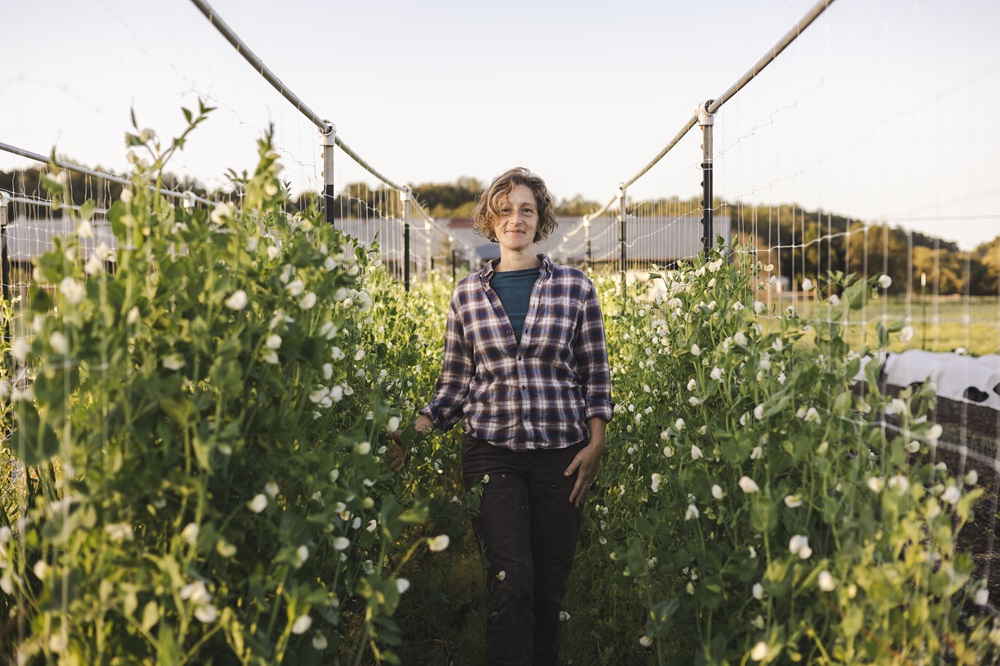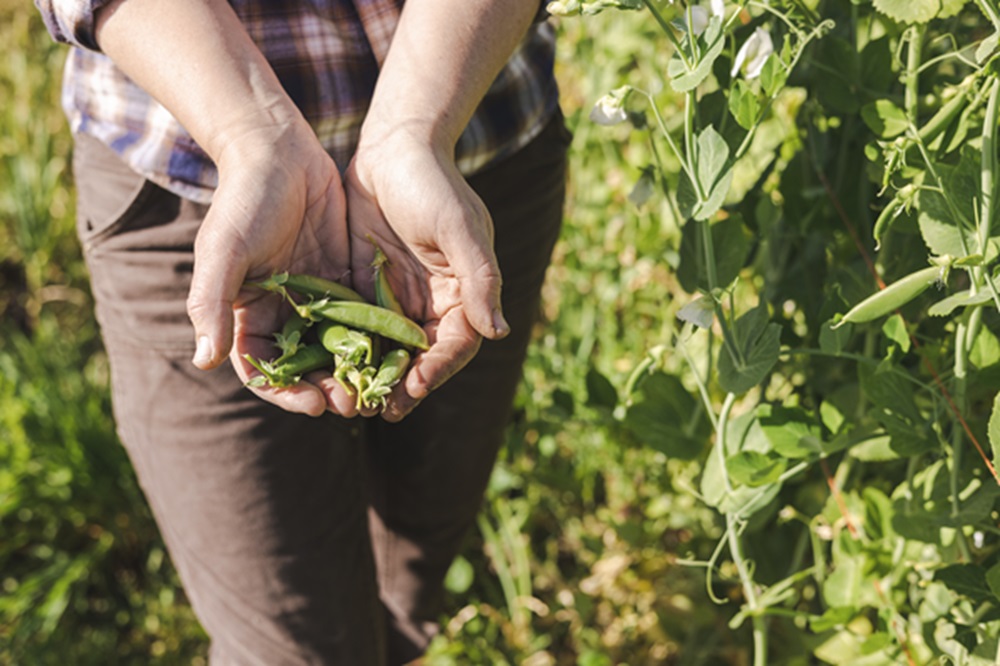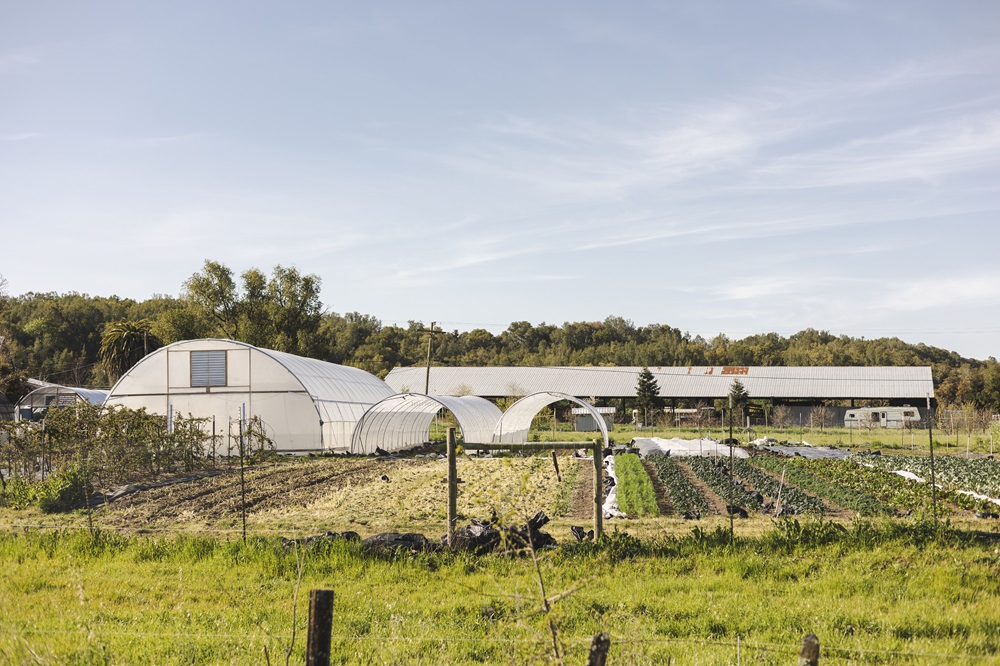Life on Coyote Family Farm: Growing Healthy Food, a Rewarding Livelihood and a Joyful Life
Sonya Perrotti interviewed by Lauren Papalia
PHOTOS BY KELSEY JOY PHOTOGRAPHY
The first thing that strikes me are all the wings: bees, dragonflies, lacewings, butterflies. Just to name a few. Teeming with aerial action, the farm is abuzz with life. Everywhere, there is a pervasive sense of interaction and collaboration. Pollinators are very busy around here, and so are the humans at Coyote Family Farm, a 2.5 acre, organic vegetable and flower operation in Penngrove. Founded in 2014, the farm is headed by Sonya Perrotti, FEED Cooperative producer member, who also lives on the land with her husband, Alex, and their two sons.
Entering her eleventh season of production, Perrotti (along with a small farm crew) is rooted in her commitment to responsible land stewardship and a strong sense of community. “We grow nutrition, and we grow delight”, Perrotti tells me. It’s a simple statement, but it does not come across as trite. Instead, what resonates is an honest declaration of love of farming and a responsibility for nurturing the land which provides.
Lauren Papalia: People are called to work on the land in myriad ways and for a broad spectrum of personal reasons. How did Coyote Family Farm come to exist? What was the driving force?
Sonya Perrotti: I have been interested in agriculture since high school, but I didn’t see farming as a feasible career. I majored in sustainable agriculture at UC Santa Cruz, but it took me many years to have the clarity and courage to actually dive into farming. I completed a Farmer Training Program with California Farm Academy in 2013 and that helped me have the confidence to jump in. I also love cooking and find the experience of growing, handling, and thinking about produce satisfying.
LP: Can you describe some of the nuances of your topography and the challenges and advantages that come with it?
SP: We are situated right between two watersheds at the foot of Sonoma Mountain, so the biggest challenge is the rocks! Creeks have meandered back and forth across this land for millennia, depositing silt and all sizes of volcanic rock. We are also on the edge of the fog belt that streams in from the Petaluma Gap. This is often an advantage: we get warm summer days that can ripen tomatoes, peppers, and melons, but we also can grow leafy greens for most of the year.
LP: I can’t help but note how very happy the farm as a living body appears. Can you highlight some of your efforts to work with the native ecosystem here?
SP: We purposely grow on only a small part of the property. This is largely a practical choice: our rocky soil is not optimal for machine-intensive growing, and my own management skills are better suited to a small acreage. Growing intensively also allows us to leave extensive native habitat. Consequently, we have a lot of wildlife on and around the farm. We have a native plant hedgerow along one border of the field that creates habitat for native species, including predatory insects that help us with pest control.
LP: You’ve mentioned previously that, as a farmer, it’s hard to live up to your values when it feels like many things you have to do to have a sustainable business are a compromise. Where do you see yourself compromising the most?
SP: In terms of economic success and community/ecological values, I think that not being able to provide for the whole community, including those who are food insecure, is a compromise. But, I also don’t believe that that’s the responsibility of the individual farmer. You can’t save the earth and feed everybody and pay your people and yourself and protect your mental health and have good relationships. That’s a big part of why our work with FEED feels so meaningful: it’s a co-created institution that helps us be more financially sustainable and better community members at the same time.
LP: That said, what DO you think the role of the farmer is? To whom or what are you beholden?
SP: I feel beholden to my employees to provide the most rewarding livelihood I can, to the land to make the best use of it, to my customers to provide healthy food, and to myself and my family to have energy left at the end of the day to enjoy life. I work at seeing these responsibilities as joy-giving privileges, not overwhelming burdens. It really is incredible to be able to do tangible, embodied work that directly impacts the community.
LP: I think that work/life balance is so important for small family farms like yours. As a producer member of FEED, how do you see our cooperative model alleviating some of those challenges?
SP: The skills that make you a good farmer aren’t necessarily the same as certain organizational skills, like grant writing for instance. We need help organizing so that we can focus on farming. I think providing structure within the co-op would be helpful. In a collective of farmers, if we all have the same skills, we are going to be reinventing the wheel without enough support. So it’s cool to have people who have other skills and the bandwidth and time to be creative and troubleshoot issues.
LP: What are your hopes for Coyote Family Farm in the next few years?
SP: I always want to be a better grower and employer. I want to keep doing what we’re doing, ideally more easefully as the farm matures. Also, I’ve spent the last 10 years devoting most of my life energy to learning to parent and learning to farm, and I hope to have a little extra going forward to explore other exciting things: music, writing, travel, and supporting the farm community.
Coyote Family Farm
3662 Lichau Road, Penngrove
Eat through the seasons with Coyote Family Farm
May 1-November 20



